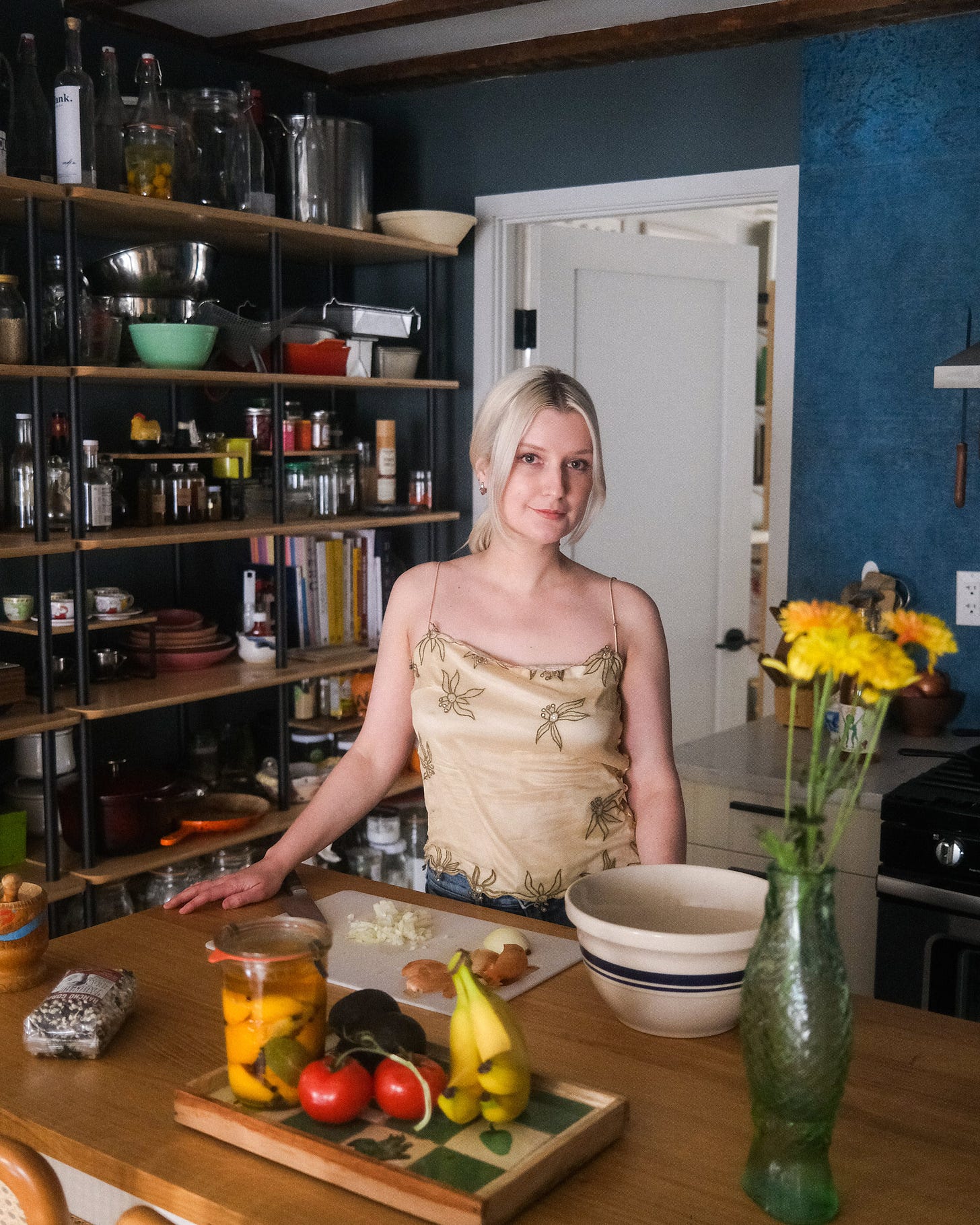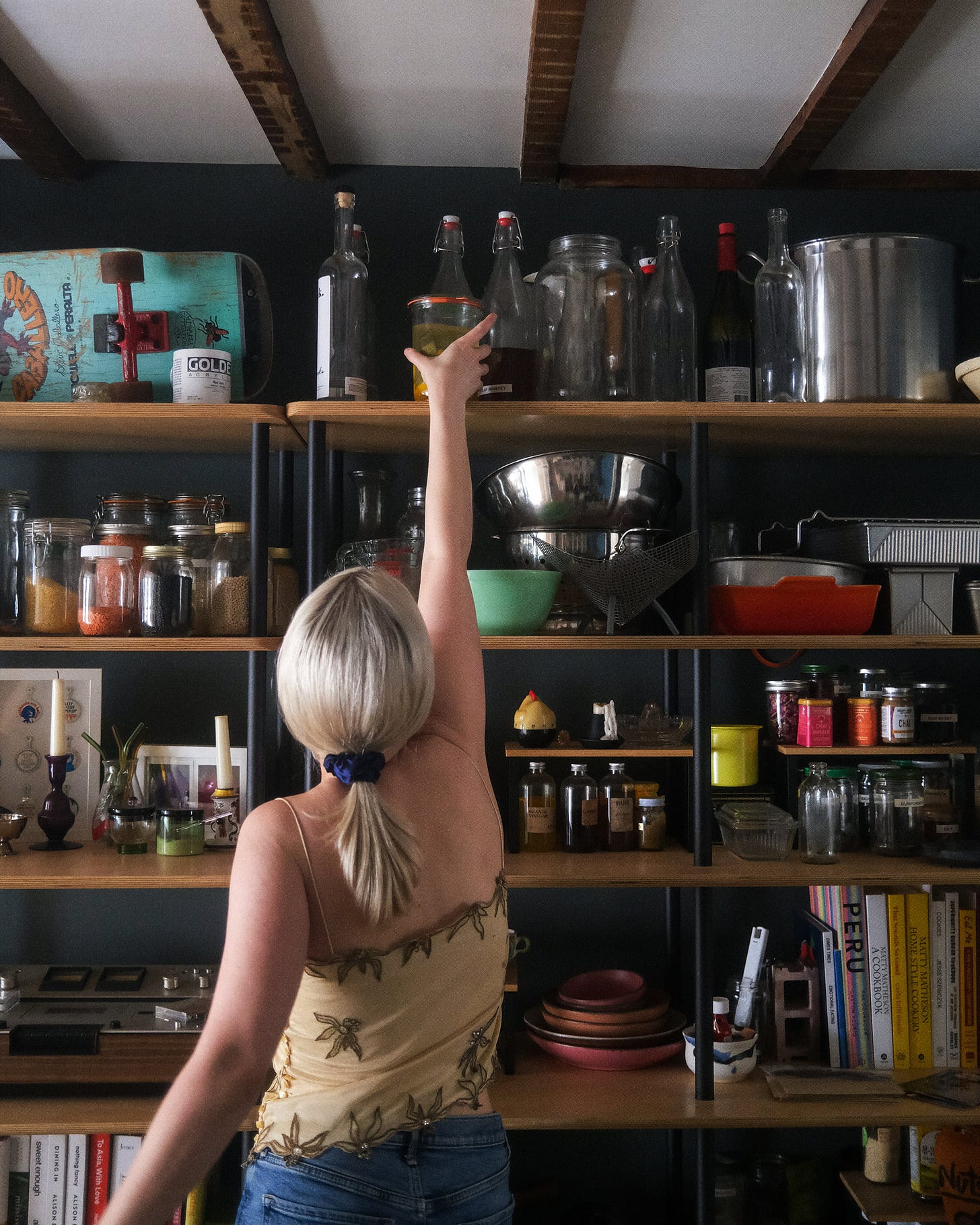
Discover more from Home Food
I’m nearing the anniversary of writing this newsletter and I’m realizing that, other than the obvious things a reader could infer through the dozen or so essays I’ve written—that I’m a vegetarian and gardener and home cook—you don’t really know anything about me. I admire a sense of mystery and am hesitant to appear self-important, but I’m writing this newsletter each month because it is something I myself want to read, and I know I would appreciate some context.
The short-ish story is that I’m in my early 30s. I live on a quiet street in a historic district in Brooklyn, New York, with my husband and cat. We rent our apartment, a two-bedroom garden level in a brownstone with a shared backyard, where I lovingly tend a shady vegetable garden.
When I was 18, I moved to New York from Boise, Idaho, the largest city in the small Mountain West state. Boise itself is in the south, in a high desert climate, meaning it has the typical markers of a desert—dry and hot, with sparse vegetation—but snowy and cold in the winter. I was homeschooled (almost entirely until I was in high school) and raised Evangelical Christian. I am no longer religious.
After a year in New York, I was shrewd enough to realize that art school—for which I had to take out ungodly student loans and where everyone had their parents’ credit cards—wasn’t worth the cost and I moved to Portland, Oregon. In Portland, I changed my degree to communication design, finished art school, and met my now-husband, Skylar. Bored of the scene in Portland after graduation, I moved back to New York when I was 23.
I have mostly worked for magazines and news sites since, with a brief stint in campaign politics. I’m currently the director of a team of photo editors, designers, and art directors for three news websites, where I have worked for the last five (!) years. My team creates, commissions, or selects the images (photography and illustration) you see on news articles.
I’ve always been an internet girlie. I count myself lucky for having come of age in the golden era of internet writing and creative expression, before For You pages and rampant monetization. When I was 15, I started a sorta-successful scrapbooking blog that I somehow hid from my parents. I still count many of the women I met from that world during that time as my good friends.
For the past year or so, however, I’ve felt anchorless on the internet. Perhaps naive of me, but I never thought the internet would stop being fun. Even after it had lost much of its early shine, I still felt like I could joke with my friends on Twitter and read something funny or interesting, or both. When Twitter was sold, the color had fully faded—even Instagram, a place I had always found benignly entertaining, became boring and repetitive, too.
So I picked up this newsletter list, one that I started on TinyLetter years ago, and resurrected it to make the kind of thing I missed.
Why food? Why home food?
I was a very picky child. The type of picky eater that breaks even the most stern of parents. I made my summer camp counselor sob because I wouldn’t eat the camp’s pancakes—wouldn’t eat anything that did not appeal to me.
I have a distinct memory of my mom telling me I couldn’t leave the dinner table until I ate the now cold meatloaf off my plate. I was an easy child—shy, fearful of “sinning,” of bringing any type of attention to myself, especially bad attention. But when she left the room, I did the only thing I could do: I hid the meatloaf under other garbage in the kitchen trash can.
I think I was so stubbornly picky for two reasons. The first was that I was fearful. I was fearful of throwing up someone else’s mom’s scrambled eggs the morning after a sleepover. I was scared of being vulnerable and trying something new in front of other people (a tic I have to this day).
The second, which may be a bit of adult editorializing, was that I wanted to feel in control. I was a timid and nervous child. But even though I knew it would cause strife or awkward standoffs, it felt empowering to say no, to be stubborn about something I felt strongly about. I did eat plenty (just not at summer camp), but only what I wanted to eat. I’ve wondered if that’s partly what motivated me to become a vegetarian at age 17. It was another way to create rules and boundaries for myself, and do something that was rather rebellious (not eat meat) in a place like Idaho.
My parents eventually stopped trying to get me to eat what the rest of the family ate. I had to eat around their meals or prepare my own satiation. Eventually, on my own and motivated by an increasing amount of teenage embarrassment, I ate burritos, cooked vegetables, red sauce in spaghetti, mushrooms, salad greens, tomatoes, green beans, and oatmeal.
I didn’t really think too much about food—or cooking—after that. I didn’t have jobs in food service. My family didn’t have cable and I never watched the Food Network. I didn’t know who Ina Garten was until I went to college. Up until maybe five years ago, I wouldn’t have considered myself a cook at all.
I didn’t care about food until I started to read about food. One year, desiring a non-screen way to distract myself, I read (and finished) everything to figure out what it was that I liked—romance, historical nonfiction, thrillers, the well-marketed hot girl literary fiction of the moment, and food books. This was pre-Netflix special, but I picked up Samin Nosrat’s Salt, Fat, Acid, Heat, the first real cookbook I ever owned, which I read from beginning to end like a novel. But it was memoir and essays like Tamar Adler’s An Everlasting Meal and a library copy of Alone In the Kitchen With An Eggplant, a charming essay collection from 2007 about cooking and eating alone, that sparked my curiosity about food—where it comes from and what it means.
Gardening deepened this curiosity, too. I’m not a houseplant person and didn’t garner much satisfaction from keeping them alive, so I was surprised by how gratifying I found my first from-seed vegetable garden to be. It is not a coincidence that Skylar and I started getting our produce from a CSA soon after beginning my backyard garden, or that I began opting for organic whenever I could—not so much for my own health, but for the health of soil.
Understanding food is one way to understand the world. The greatest crisis of our time—that is, the climate crisis—is exacerbated by modern agricultural—not to mention the cultural, communal, and health meaning of food. I like what food has to say about living.
I am not a farmer, a climate scientist, a food activist, or a journalist. That has made me pause and wonder what it is that I have to contribute or say with authority. But every day I have to cook. And I miss reading funny, interesting, helpful things on the internet.
Thank you for reading.






I enjoyed reading about your story. Growing up I stuck with plain foods. It took a long time for me to start trying new recipes, snacks, ingredients. I'm glad you found a way to embrace food in your own way and I can relate to the endless browsing of cookbooks.
I really enjoyed reading this Kara! I totally get you on the religious upbringing and food dynamic - phew do not miss those days. Such a pleasant read 💫